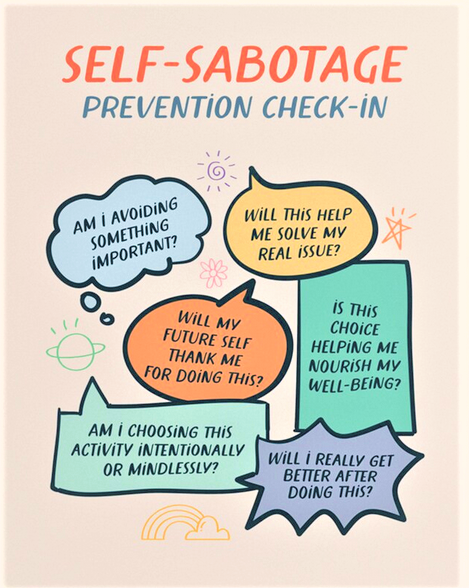

Self-love and self-sabotage are two psychological aspects that can significantly impact our choices and behaviors when it comes to taking care of our health, including our dietary choices. Let’s break down each concept and explore their relevance in the context of choosing to eat well.
- Self-Love: Self-love refers to a positive regard and acceptance of oneself, including our physical, mental, and emotional well-being. It involves treating ourselves with kindness, compassion, and respect. In the context of health and nutrition, self-love manifests in making choices that prioritize our long-term well-being and taking care of our bodies.
When it comes to eating well, self-love can influence our behaviors in the following ways:
a. Nourishment: Practicing self-love involves recognizing that our bodies deserve proper nourishment. We choose to consume nutritious foods that fuel our bodies, provide essential vitamins and minerals, and support overall health and vitality.
b. Balance: Self-love encourages a balanced approach to eating. Instead of restricting or depriving ourselves of certain foods, we focus on creating a balanced and sustainable diet that includes a variety of nutrients and allows for occasional indulgences without guilt or shame.
c. Self-Care: Making healthy food choices is a form of self-care. It demonstrates our commitment to our well-being and sends a message that we value ourselves enough to provide the nourishment our bodies need.
d. Body Respect: Self-love involves accepting and appreciating our bodies as they are. By choosing to eat well, we support our bodies in maintaining optimal health, which can contribute to higher self-esteem and body confidence.
- Self-Sabotage: Self-sabotage refers to behaviors or thought patterns that hinder our progress or well-being. In the context of health and nutrition, self-sabotage can manifest as making choices that are detrimental to our health or counterproductive to our goals of eating well.
Examples of self-sabotaging behaviors related to food and nutrition include:
a. Emotional Eating: Using food as a coping mechanism for negative emotions, such as stress, sadness, or boredom, rather than addressing the underlying issues.
b. Unhealthy Food Cravings: Giving in to intense cravings for highly processed, sugary, or unhealthy foods, despite knowing that they are not beneficial for our health.
c. Procrastination: Delaying or avoiding making healthy food choices, such as meal planning or grocery shopping, which can lead to relying on convenient but less nutritious options.
d. Negative Self-Talk: Engaging in negative self-talk, such as berating ourselves for past dietary mistakes or having a pessimistic mindset about our ability to make positive changes, can contribute to self-sabotaging behaviors.
To overcome self-sabotage and foster self-love in the context of eating well, it can be helpful to:
1. Practice Mindfulness: Pay attention to your thoughts and emotions around food and make conscious choices that align with your long-term goals rather than succumbing to impulsive decisions.
2. Build Healthy Habits: Establish routines and habits that support healthy eating, such as meal planning, preparing nutritious meals in advance, and creating a supportive environment that encourages better choices.
3. Cultivate Self-Compassion: Be kind to yourself when you make less-than-ideal choices. Understand that setbacks are a natural part of the process, and practice self-compassion to bounce back and make healthier choices moving forward.
4. Seek Support: Reach out to a naturopath, nutritionist, or therapist for guidance and support in building a healthy relationship with food and overcoming self-sabotage patterns.
By fostering self-love and being aware of self-sabotaging tendencies, we can make conscious choices that prioritize our health, well-being, and long-term goals when it comes to eating well.
When it comes to self-sabotage and diet, a naturopathic doctor may:
- Assess your current dietary habits: They will review your diet and assess how it may be contributing to your health concerns or self-sabotaging behaviors.
- Identify triggers and patterns: Through thorough examination and discussion, they can help you identify triggers or emotional patterns that lead to self-sabotaging behaviors around food.
- Provide education and guidance: NDs can offer evidence-based information on nutrition and healthy eating principles. They can educate you about the benefits of balanced nutrition, the importance of certain nutrients, and how to make informed choices.
- Support behavior change: NDs can assist you in setting realistic goals and developing strategies to overcome self-sabotage. They may help you create personalized meal plans, suggest healthier alternatives, or offer tips to manage cravings and emotional eating.
- Address underlying imbalances: Naturopathic doctors take a comprehensive approach to health, aiming to address underlying imbalances or factors that may contribute to self-sabotage. They may consider factors like hormonal imbalances, gut health, stress levels, and emotional well-being when developing a treatment plan.
It’s important to note that while naturopathic doctors can provide guidance and support, overcoming self-sabotaging behaviors around diet requires active participation and commitment from the individual. Additionally, if you’re struggling with severe self-sabotage patterns or underlying emotional issues, it may be beneficial to also seek support from therapists who specialize in eating disorders.

